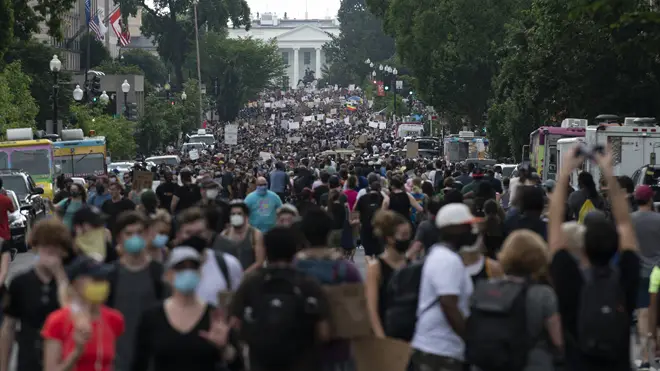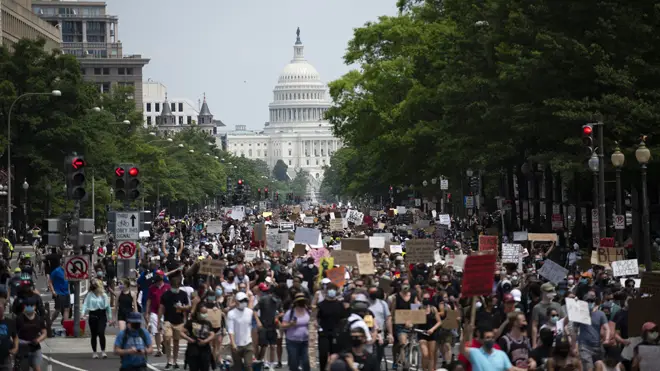
Nick Abbot 10pm - 1am
7 June 2020, 10:02 | Updated: 7 June 2020, 10:26

Nick Harper reports from anti-racism protests in Washington
Tens of thousands of people peacefully marched against racism and police brutality in US cities yesterday.
Protesters gathered in cities across the US calling for fundamental change in the relationship between law enforcement and citizens in the wake of the death of George Floyd, the black man whose death at the hands of Minneapolis police has galvanised the expanding movement.
Tens of thousands marched in the biggest mobilisation since Mr Floyd died 12 days ago. Many cities have begun lifting curfews that authorities imposed following initial angry protests, riots and looting.

Authorities have softened restrictions as the number of arrests plummeted.
Demonstrations also reached four other continents, ending in clashes in two European cities.
The largest US demonstration was in Washington, where streams of protesters flooded streets closed to traffic.
Peopl gathered at the Capitol, on the National Mall and in neighbourhoods. Some turned intersections into dance floors. Tents offered snacks and water.
At the White House, which was fortified with new fencing and extra security measures, chants and cheers could be heard.
President Donald Trump, who has urged authorities to crack down on unrest, downplayed the demonstration, tweeting: "Much smaller crowd in D.C. than anticipated."
Elsewhere, the backdrops included some of the nation's most famous landmarks.
Peaceful protesters walked across the Golden Gate Bridge in San Francisco and the Brooklyn Bridge in New York.
They walked the boulevards of Hollywood and a Nashville, Tennessee, street famous for country music-themed bars and restaurants.
In Philadelphia and Chicago, people chanted, carried signs and occasionally knelt in silence.
A large crowd of medical workers, many in lab coats and scrubs, marched to Seattle's City Hall.
They held signs reading: "Police violence and racism are a public health emergency" and "Nurses kneel with you, not on you" - a reference to how a white officer pressed his knee on Floyd's neck for several minutes.
In Raeford, North Carolina, a town near Floyd's birthplace, people lined up outside a Free Will Baptist church, waiting to enter in small groups.
At a private memorial service, mourners sang along with a choir. At the front of the chapel was a large photo of Floyd and a portrait of him adorned with an angel's wings and halo.
Floyd's body will go to Houston, where he lived before Minneapolis, for another memorial in the coming days.
Protesters and their supporters in public office say they are determined to turn the outpouring into change, notably overhauling policing policies.
Many protesters urged officials to "defund the police," which some painted in enormous yellow letters on the street leading to the White House near a "Black Lives Matter" mural that the mayor had added a day earlier.
Some change has already come.

Minneapolis officials have agreed to ban chokeholds and neck restraints and require that officers stop colleagues who are using improper force.
California Governor Gavin Newsom ordered the state's police-training program to stop teaching officers a neck hold that blocks blood flowing to the brain.
Congressional Democrats are also preparing a sweeping package of police reforms, which is expected to include changes to immunity provisions and creating a database of use-of-force incidents.
Revamped training requirements are planned, too, among them a ban on potentially fatal chokeholds.